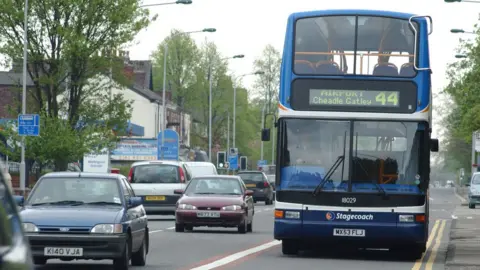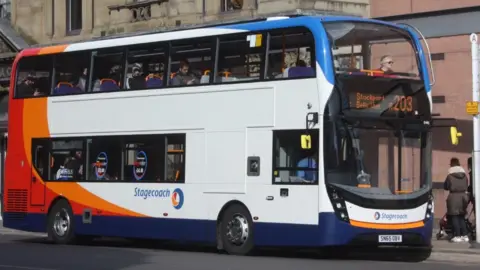Stagecoach tries to innovate as bus passenger numbers fall
 Stagecoach
StagecoachBus operator Stagecoach has warned investors that passenger numbers may not return for years.
The Perth-based transport company has set out wide-ranging innovations to bring people on board.
The operator is looking overseas to diversify, with bids to take over services in Dubai and Sweden, as a way to rely less on the UK bus industry.
Stagecoach ended its railway operations following a disagreement over terms with the UK Government.
Its warning about long-term reduced passenger numbers follows the steep decline with the introduction of lockdown, while it has been subsidised by governments to keep services running for key workers.
Looking ahead, it forecasts permanent shifts in customer behaviour that will mean less bus travel, including an increase in home-working, more tele-medicine meaning fewer hospital visits, more shopping from home and increased home education.
 Stagecoach
StagecoachInnovation in Stagecoach bus services has been accelerated by the health crisis, with pilot contracts in the English Midlands to run services which are only for NHS staff.
It is also trialling on-demand services through an app, online or phone, for NHS workers as well as for smaller communities in the Tees Valley area.
With employer concerns about safety of staff returning to work after lockdown, Stagecoach managers see an opportunity to run more special services for companies.
That has begun this year working with Sellafield nuclear site in Cumbria. It is to be expanded to Aberdeen City Council and Kent University from next month.
On its standard public services, Stagecoach is looking to deals with employers which offer reduced fares for their staff.
It has stepped up its use of contactless and digital advance payments, with 46% of transactions now carried out that way.
And the bus firm is planning more use of price-capping for card payments - a process already used by Lothian Transport, which means that multiple journeys in one day or one week carry a maximum charge.
Research for Stagecoach found that simplifying fares can lead to an improved perception of value for money, and makes people more likely to travel by bus. Some 69% of those taking part in a survey said that they find bus services confusing, and more than a third said they would use them more if that changed.

The firm is stepping up marketing and advertising beyond local markets to boost the company's national profile.
Stagecoach is working with the Falkirk bus builder Alexander Dennis to develop autonomous bus technology, to reduce costs in depots, and with the first regular route planned for later this year across the Forth Road Bridge.
'Ready and committed'
In its annual results, the company reported income was down from £1.878bn to £1.417bn, with pre-tax profits falling form £133m to £91m. The figures were affected by both the lockdown and by the loss of its West Coast rail franchise from December.
Martin Griffiths, the chief executive, commented: "Despite recent events, it is critical that all partners continue to work together to prioritise better mobility, maintain the cleaner air and take action to protect the future of our planet as part of the plan for global recovery. We are ready and committed to play our part".

- SYMPTOMS: What are they and how to guard against them?
- 40,000 DEATHS: Could they have been prevented?
- FACE MASKS: When should you wear one?
- RULES: What can I now do - and what are the rules?

